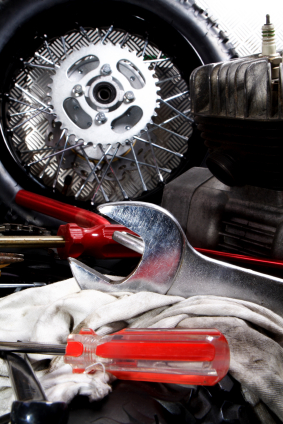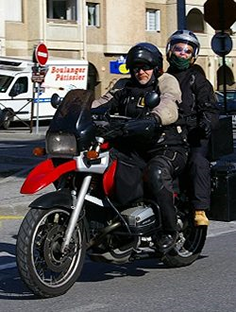 On Tuesday 22nd January 2013, the TRAN Committee held a Public Hearing concerning the proposals for new EU-wide Road Worthiness Testing (RWT) also known as Periodical Technical Inspections (PTI) for cars, powered two-wheelers (PTWs – motorcycles – scooters – mopeds) and commercial vehicles and trailers.
On Tuesday 22nd January 2013, the TRAN Committee held a Public Hearing concerning the proposals for new EU-wide Road Worthiness Testing (RWT) also known as Periodical Technical Inspections (PTI) for cars, powered two-wheelers (PTWs – motorcycles – scooters – mopeds) and commercial vehicles and trailers.
The European Commission representative commented that, “In a country where you apparently have very civilised motorbike riders you inspect them (the motorcycles), thus it is one more reason to actually inspect them in other member states who believe that the population of motorbikers is not so responsible and educated.”
That must mean that in Northern Ireland we are very civilised, responsible and educated motorcyclists!
The other comment that the Commission representative made which we picked up was that the proposal aims to ensure “minimum standards”. We take that to mean a level playing field throughout Europe for Member States to carry out road worthiness testing.
We should remember that any roadworthiness test and certificate issued confirms that a vehicle at the time of its test (as far as can be reasonably determined without dismantling) meets the minimum acceptable environmental and road safety standards required by law, it doesn’t mean that the vehicle is roadworthy for the life of the certificate and isn’t a substitute for regular maintenance.
Moving swiftly on, at Right To Ride what interests us is the changes there would be in the proposal, which seeks to introduce mandatory RWT for PTWs across Europe.
More importantly, how that would affect riders in those countries who already have RWT, for example, in Northern Ireland and GB we have testing known as MoT.
In concluding the TRAN meeting the rapporteur German MEP Werner Kuhn of the European People’s Party (Christian Democrats), outlined that the rapporteurs – MEPs dealing with the proposal for the European Parliament, all have different perspectives, different focuses and different priority interests.
Within those priority interests Mr Kuhn said that we need to focus on:
- Harmonizing technical standards for inspections
- Independent monitoring and checking bodies
- Trained and qualified people carrying out checks
- Implementation in all member states
- Highest possible technical standards that can be realistically implemented
- Proper Enforcement and mutual recognition of the results of the tests through all member states
Concerning motorcycling Mr Khun stated, “It is important that we consider mopeds and motorbikes.” adding that, “These are all matters, which I think we will tease out further down the line when we have further discussions.”
Position In Relation To The Proposal
Rather than focus specifically on all the comments from the various stakeholders, we prefer to explain our position in relation to the proposal, based on our analysis of a number of factors and not just those put forward at yesterday’s hearing.
From all the various studies that have been carried out (including our own), we see that mechanical defects are NOT a major cause of primary and secondary accidents for PTWs.
In our view, the best yardstick for determining whether there are problems with motorcycles, scooters, mopeds from a mechanical perspective is the failure rates of MoTs (aka RWT) – typically 7% per annum here in Northern Ireland.
(In Northern Ireland the government agency DVTA (Driver Vehicle Testing Agency) carries out the MoTs at designated testing centres. Interestingly, in Great Britain (England, Scotland and Wales), the failure rates are far higher – typically 21% and we can’t help thinking that this may be due to the fact that the MoT is carried out by private sector mechanics.)
The reasons for failure in Northern Ireland for motorcycles, scooters and mopeds are mainly electrical issues including lights and wiring (c.40%); c.17% for near side headlamps; brake systems at around 10%; also 10% for tyres/wheels and 5% for exhaust systems, based on data provided by the DVTA over the four year period, 2007 to 2010.
The Northern Ireland DVTA publishes failure rates for cars every month – and brakes are the most common reason for failures with an average of around 20% – 22% (i.e. double that for motorcycles).
DVTA Pass Rates & Reasons for Failure
In that respect, one could argue that there is a safety issue in terms of reasons for carrying out an MoT (RWT) for both cars and motorcycles – but we would see it as a preventative measure.
Motorcyclists And Manufacturers Representation?
We were fascinated by the arguments put forward by the FIA (Fédération Internationale de l’Automobile) representative, Laurianne Krid at the hearing (who also mentioned that the FIA represents 8 million motorcyclists!) and we think there is a lot of mileage (excuse the pun) in what she had to say regarding casualties and age of vehicle – that there does not appear to be a correlation.
She suggested that in terms of proportions of older cars and crashes, that it may be due to the fact that more young people drive older vehicles – this is quite probably true, but it is also true that there is a higher proportion of older vehicles in the parc (registered vehicles in circulation), so proportionately it stands to reason that more older cars would be involved in crashes.
FIA Region I Briefing on PTI – pdf – 2.5mb
In that respect, we would assume that this analysis could be extrapolated to PTWs. What this suggests is that we need to look for other reasons than this to consider why we should have regular road worthiness testing.
ACEM (European Association of Motorcycle Manufacturers) put forward a very persuasive argument in favour of RWT for PTWs and by and large we are supportive of their position.
Especially with regards to the changes that IMCO Committee (Internal Market and Consumer Protection) spearheaded with the Regulation for L category vehicles – specifically relating to emissions and braking systems.
ACEM’s Presentation to Public Hearing – pdf – 404kb
ACEM’s position on RWT – pdf – 158kb
The other aspect which Antonio Perlot of ACEM touched on at the TRAN Committee meeting, was that 59% of the PTW parc is made up of vehicles with an engine size of 125cc and under and as he pointed out, these are mainly owned by commuters or young people who are less inclined to take the same level of care that a passionate older motorcyclist might do.
Therefore we believe a regular check would be beneficial – for the reasons indicated above – regarding failures.
It is also important to ensure that the vehicle is legally roadworthy – i.e. that all parts are legal such as exhaust systems and in the case of mopeds and other restricted bikes, that they have not been tampered with.
Cost implications
We understand that there are serious cost implications for governments throughout Europe and in that respect we are supportive of the Northern Ireland Assembly’s position that the proposal should be made a Directive rather than a Regulation.
We believe that this option would allow countries to choose what suits them best, including opting out of testing PTWs, if that is what they wish.
The Northern Ireland MoT system would implode if tractors, caravans and trailers were to be tested, not least because the testing stations would struggle to accommodate these vehicles and because setting up a registration system for trailers would be far too onerous in terms of cost and implementation.
Regularity of RWT
In terms of regularity for RWT, a Directive would allow countries such as the UK to continue MoTs on a yearly basis while allowing others – typically the Nordic countries where motorcycling is seasonal thus the mileage and usage is far lower than the rest of Europe – to use the 4-2-2 system, or whatever they find appropriate to their needs and requirements.
Rights and Responsibilities
At the first TRAN Committee meeting on RWT (held in December 2012), the Commission side stepped the issue of data in terms accident causation and refers to motorcycles – (Powered Two Wheelers) as, “quite similar to a normal vehicle integrating a lot of new technologies” that would lead for consideration on the same footing as other vehicles, “in terms of regular inspections.”
The comment made by the Commission’s representative at that meeting should not be put aside or treated lightly, because this underpins a discourse that has driven rider organisations over the last 40 odd years, which is to be treated equally in the transport mix. That means accepting the same responsibilities.
From our perspective, governments need to know that the vehicle fleet on their roads has minimum standards of road worthiness and emission levels and there are only two ways of doing this – roadside checks – and regular testing.
With regards to emissions, cars are taxed in the UK based on their CO2 levels and the annual MoT ensures that those levels are monitored.
Now that the motorcycle industry will be required to do the same for motorcycles, scooters and mopeds, it seems reasonable to expect that this sector of vehicles will be afforded the same rights.
Competition
There is possibly another argument that needs addressing which is competition.
We in Europe expect and demand quality products. We expect and demand redress if these products are not to the standards that manufacturers promise.
In a global economy, products from other countries such as India, China and Russia must adhere to European standards in order to be allowed into the European markets. Equally, the European manufacturers must provide a standard over time for our vehicles through warranties.
We as Europeans have an opportunity to ensure that our standards are of the highest quality, but our opinion is that we, as consumers, can only achieve this by playing the game which includes accepting road worthiness testing.
Comment to this at Right To Ride EU – Click Here
Links Information
TRAN Committee Draft Report, scheduled for publication by the 7th March, with a deadline for amendments on the 22nd March.
Also scheduled but subject to change, is the Vote in TRAN Committee May 2013 – Vote in Parliament plenary July 2013
Video of the meeting still available go to 16:24:00 – Click Here
Our reporting and quotes are taken from the recording of the meeting and includes interpretation of the original speaker. We have endeavoured to report this accurately.
FIA (Fédération Internationale de l’Automobile) Region 1 – www.fiaregion1.com
FIA Region I Briefing on PTI – pdf – 2.5mb
ACEM (European Association of Motorcycle Manufacturers) – www.acem.eu
ACEM’s Presentation to Public Hearing – pdf – 404kb
ACEM’s position on RWT – pdf – 158kb
Library of the European Parliament
A page published on the Library of the European Parliament’s website, gives detailed information on the “Roadworthiness Package”.
From links to the European Commission’s presentation of the three legislative proposals contained in the Roadworthiness Package to overviews, analysis, Stake holder views, NGO views, Producers views, Statistics and EU Programmes and projects.
Library of the European Parliament – Click Here



Speak Your Mind